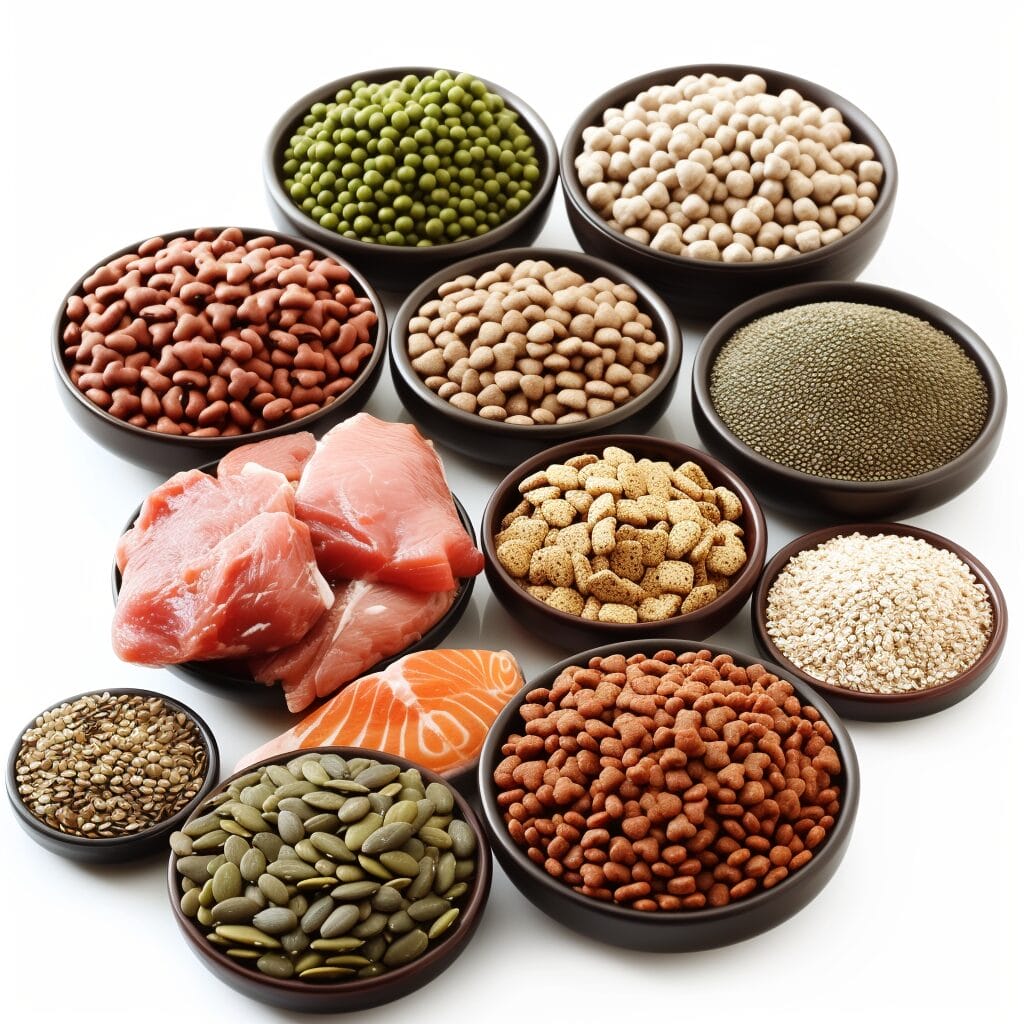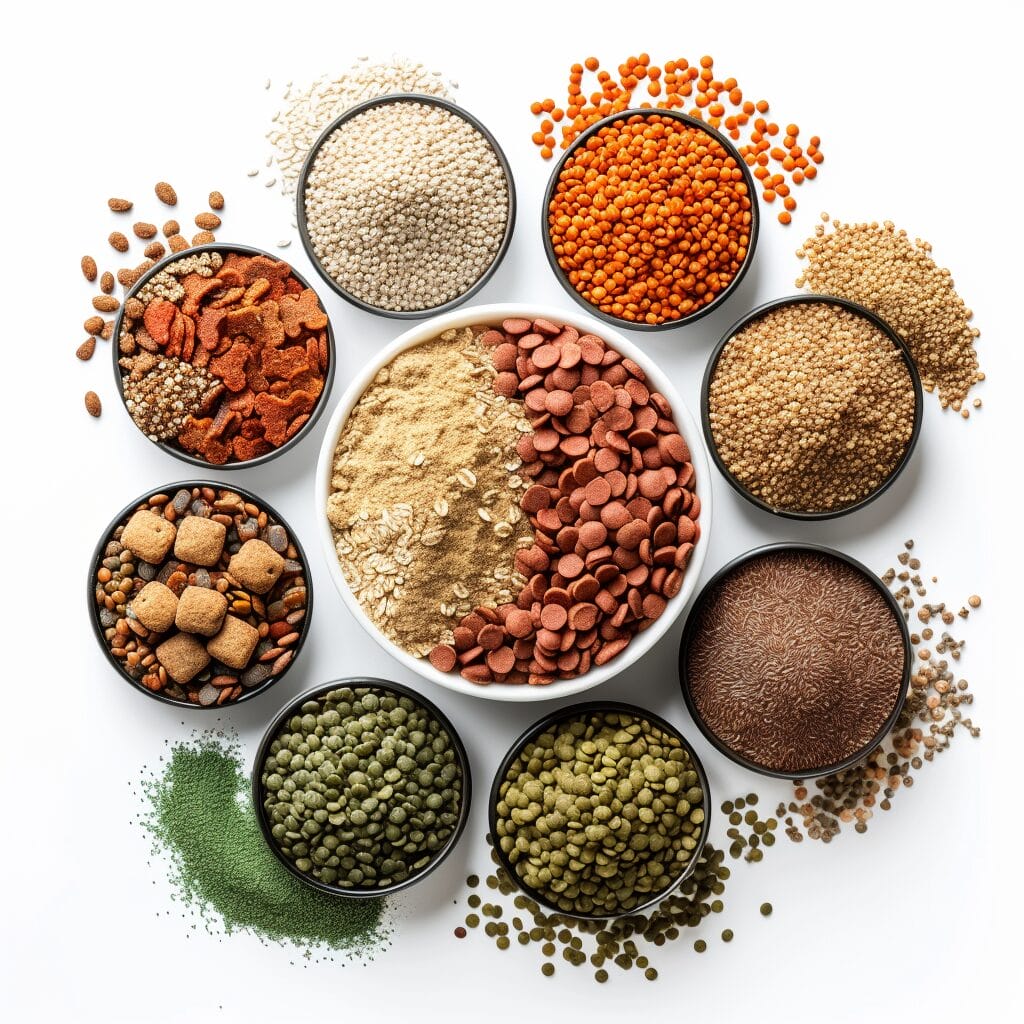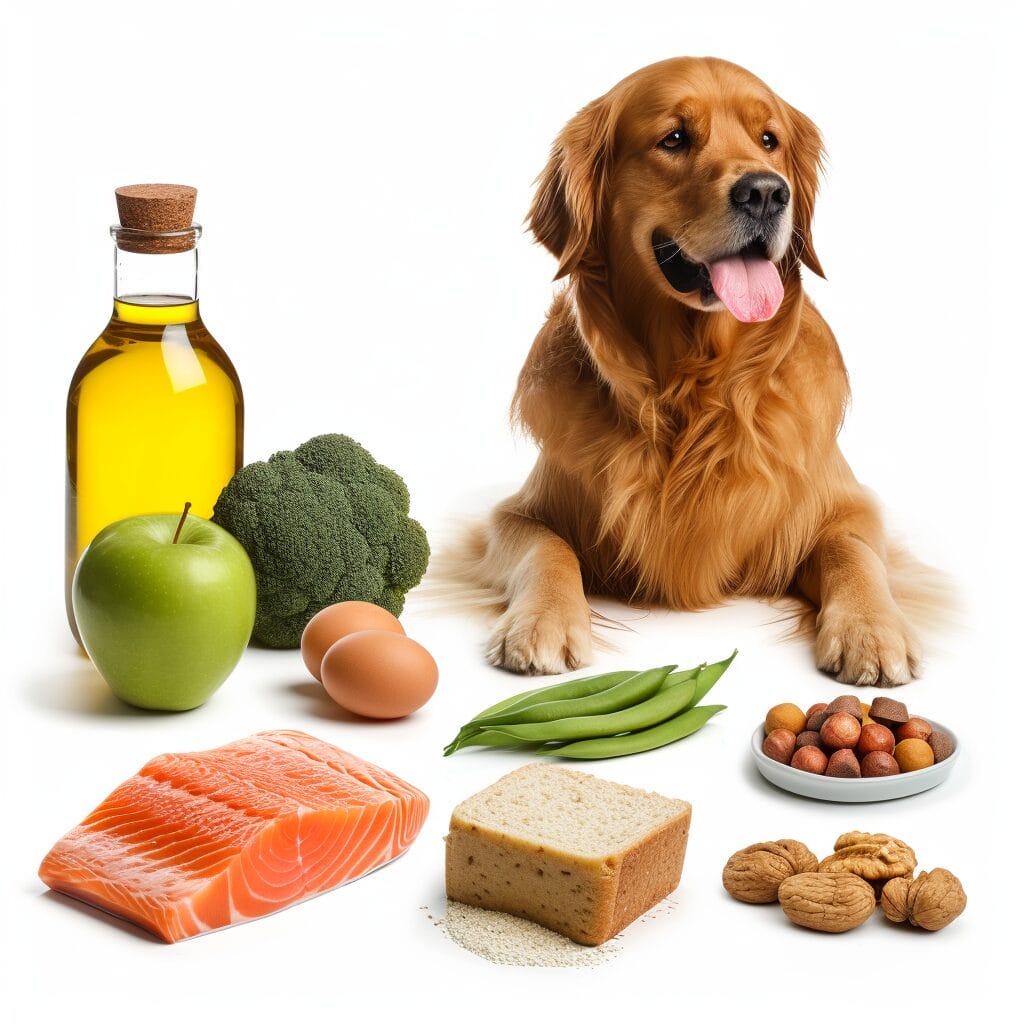Ever wondered if your furry friend’s food packs enough protein punch? Discover why protein matters, learn how to pick the best option for your pup, and unravel the mysteries of pet nutrition. Get ready to become a savvy pet parent who knows exactly what goes into that bowl. Your four-legged buddy will thank you for serving up meals packed with just the right amount of goodness.
How Much Protein is in Dog Food?
Key Takeaways
- Ensure your dog’s food meets their protein requirements based on factors like age, size, and activity level.
- Understand the nutritional composition of dog food labels to identify the protein content and other essential nutrients.
- Choose dog foods with high-quality protein sources like real meat to support your dog’s overall health and well-being.
- Be aware of how protein intake can impact your dog’s health, including muscle development, immune function, and energy levels.
- Balance the protein content in your dog’s diet with other essential nutrients to maintain a healthy and balanced nutrition profile.
- When selecting high-protein dog food, carefully read labels to ensure it meets your dog’s specific dietary needs.
Protein Requirements for Dogs

Variability in Protein Needs
Dogs’ protein requirements differ based on age and activity level. Puppies, being in their growth phase, need more protein than adult dogs to support their development.
Protein is vital for a dog’s overall health. When selecting dog food, it’s crucial to consider your pet’s specific needs regarding protein intake, ensuring they receive an appropriate amount based on factors like age and lifestyle.
Meeting Puppy Protein Needs
Quality puppy food should contain around 22% – 32% of protein content to support healthy growth and development. Examples of high-protein sources suitable for puppies include chicken, beef, fish, and eggs.
For instance:
- Chicken-based puppy formulas provide essential amino acids necessary for muscle growth.
- Fish options offer omega-3 fatty acids that promote brain development.
- Beef contains iron which supports healthy blood circulation.
Adjusting Senior Dog Diets
Senior dogs typically have lower energy levels than younger counterparts; hence they require less protein in their diets.
Considerations:
- Opting for lean proteins such as turkey or lamb helps maintain muscle mass without overloading older dogs’ kidneys.
- Eggs are also an excellent source of easily digestible protein suitable for seniors.
Nutritional Composition of Dog Food

Ingredient List by Weight
Dog food labels are required to list ingredients by weight, with the heaviest components listed first. When checking the label, ensure that a named protein source is among the primary ingredients.
A well-rounded diet for your furry friend should include adequate amounts of these essential nutrients. Ensure that protein sources are not only present but also appropriately proportioned in relation to other components.
Importance of Balanced Nutrition
Balanced nutrition is crucial for your dog’s overall health and well-being. It plays a significant role in supporting their immune system, muscle development, and energy levels.
High-quality proteins such as chicken, beef, fish, or lamb offer better nutritional value than fillers or by-products commonly found in lower-quality pet foods.
Essential Nutrients for Dogs

Protein Content in Dog Food
Different dog foods contain varying levels of protein, depending on the brand and type. It’s crucial to check the protein content to ensure your furry friend gets adequate nutrition.
When selecting dog food, look for options with high-quality protein sources like chicken, beef, or fish. However, be cautious of excessive protein levels as they can lead to health issues in some dogs.
Pros:
- High-quality protein supports muscle development.
Cons:
- Excessive protein intake may cause health problems in some dogs.
Other Essential Nutrients
Vitamins such as A, D, E, and K are crucial for various bodily functions. Minerals like calcium, phosphorus, sodium play a significant role too.
These fatty acids aid in reducing inflammation and promoting heart health among other benefits.
- Adequate intake of vitamins & minerals ensures proper body function.
- Omega-3 & omega-6 fatty acids promote healthy skin & coat.
Importance of Water
While often overlooked when discussing nutrients in dog food, water is actually one of the most critical components of a canine’s diet. Ensuring your pet has access to clean water at all times is vital for hydration, digestion processes, and overall well-being.
Key Information:
- Proteins help with muscle growth.
Protein Quality and Source for Dogs

Animal-based Proteins
High-quality protein for dogs primarily comes from animal sources such as meat or fish. These proteins provide essential amino acids necessary for your dog’s overall health. For example, chicken, beef, and salmon are excellent sources of protein commonly found in dog food.
Animal-based proteins are easily digestible by dogs and closely mimic their natural diet in the wild. They help support muscle growth, repair tissues, and maintain a healthy coat and skin. When selecting dog food, prioritize products with real meat listed as the first ingredient to ensure your furry friend receives adequate high-quality protein.
Plant-based Proteins
While plant-based proteins can be included in dog food formulations, they should not serve as the main source of protein. Legumes like peas or lentils can offer supplementary protein but may lack certain essential amino acids crucial for dogs’ well-being if used excessively. Including a variety of plant-based ingredients alongside animal proteins can enhance the overall nutritional profile of the dog food. However, it is vital to avoid fillers like soy or corn being used as primary protein sources since these may not provide sufficient quality protein content required by your pet.
Impact of Protein on Dog’s Health

Muscle Development and Repair
Protein in dog food is crucial for muscle development and repair. It helps dogs stay strong and active. Without enough protein, dogs may struggle to build muscle mass or recover from injuries.
Proteins are made up of amino acids, which act as the building blocks for muscles. When a dog consumes protein, these amino acids are utilized to repair damaged tissues and promote healthy muscle growth. For example, if a dog is recovering from surgery or intense exercise, a diet rich in protein can aid in the healing process.
- Adequate protein supports muscle development and repair.
- Dogs need protein to maintain strength and mobility.
Kidney Health
However, it’s essential to strike a balance because too much protein can be harmful. Excessive amounts of protein in dog food can put strain on a dog’s kidneys over time. While proteins are essential nutrients for dogs, an overload can lead to kidney issues down the line.
Dogs with pre-existing kidney conditions may be especially sensitive to high-protein diets. Monitoring your dog’s protein intake, especially as they age, is crucial for their long-term health.
- Excessive protein can strain a dog’s kidneys over time.
- High-protein diets might not be suitable for all dogs’ kidney health needs.
Skin and Coat Health
In addition to muscle development and kidney health concerns related to protein, this nutrient also plays an important role in maintaining healthy skin and coat in dogs. Proteins contribute significantly to the overall appearance of a dog’s skin and fur quality.
When included at appropriate levels in their diet, proteins help support healthy skin cell regeneration while promoting shiny coats that are less prone to dryness or irritation.
- Protein plays a role in maintaining healthy skin.
- A balanced amount of protein contributes positively towards coat health.
Balancing Protein in Dog Food

Determining the Right Protein Levels
Consult with a vet to find the right protein levels for your dog. Your dog’s breed, age, and health conditions are crucial factors when balancing protein intake. Vets can provide tailored recommendations based on these specifics.
It’s essential to consider individual differences among dogs when determining protein levels in their food. For example, large breeds may require different protein amounts compared to small breeds. Older dogs or those with certain health conditions might need special diets with lower or higher protein content.
Monitoring and Adjusting Protein Intake
Regularly monitor your dog’s weight to ensure they are maintaining a healthy balance of proteins in their diet. If you notice weight gain or loss, it might be necessary to adjust the protein levels accordingly. Gradual changes can help prevent digestive issues and allow your dog’s body to adapt smoothly.
Keeping track of how your dog responds to different protein levels is key. Some signs that might indicate an imbalance include lethargy, digestive problems, or changes in coat quality. By observing these cues and working closely with your vet, you can fine-tune the protein content in your dog’s food for optimal health.
Reading Labels on High Protein Dog Food

AAFCO Certification
When checking how much protein is in dog food, ensure the label carries an AAFCO certification. This certification guarantees that the product meets essential nutritional standards for dogs. Without this seal, you might be risking your pet’s health.
It’s crucial to prioritize AAFCO certification when selecting dog food because it ensures that the product provides a balanced diet suitable for your furry friend. By choosing certified options, you’re safeguarding your pet’s well-being.
Guaranteed Analysis Section
The guaranteed analysis section of dog food labels reveals vital information about its nutritional content, including protein levels. Pay close attention to this part to determine the amount of protein present in the food you’re considering purchasing.
Understanding how to interpret guaranteed analysis will help you make informed decisions regarding your pet’s diet. This section breaks down key nutrients like protein and allows you to compare different products accurately.
Vague Ingredient Terms
Be wary of vague terms like “meat by-products” listed in the ingredients of dog food. Such ambiguous descriptions can mask low-quality proteins or even unhealthy additives present in the product.
Avoid foods with unclear ingredient labels as they may not provide adequate nutrition for your pet. Opt instead for products with specific and recognizable protein sources like chicken, beef, or fish.
Consulting a Veterinarian about Dog Nutrition

Personalized Recommendations
Veterinarians play a crucial role in ensuring your dog’s nutritional needs are met. Vets can offer tailored advice based on your furry friend’s specific requirements. By consulting a vet, you gain insights into the ideal protein content for your dog based on factors like age, breed, and activity level.
Seeking guidance from a veterinarian can help prevent feeding your dog food with excessive amounts of protein. Vets consider various aspects such as any existing medical conditions that may impact how much protein is suitable for your pet. Regular check-ups allow vets to monitor your dog’s overall health and nutrition status, making adjustments as needed to ensure optimal well-being.
- Personalized recommendations from vets
- Prevent excessive protein intake
- Monitor health and nutrition through regular check-ups
Ensuring Balanced Nutrition
Choosing the right food for your canine companion is essential for their well-being. Dogs require a balanced diet to thrive, including adequate levels of protein. Consulting a vet ensures that the food you select aligns with your dog’s dietary requirements without causing harm due to an imbalance in nutrients.
A vet can guide you on selecting high-quality dog food brands that prioritize nutritional value over fillers or harmful additives. They can recommend reputable brands known for providing wholesome meals suitable for dogs’ different life stages and sizes.
- Ensure balanced nutrition through proper food selection
- Guidance on choosing high-quality dog food brands
Homemade Balanced Dog Food Considerations

Nutritional Balance in Homemade Diets
Creating homemade dog food requires attention to nutritional balance. It’s crucial to include a mix of proteins, vegetables, and grains in your pet’s meals. Proteins are essential for muscle growth and repair, while vegetables provide vitamins and minerals necessary for overall health.
When preparing homemade dog food, consult with a veterinary nutritionist. They can help ensure that the diet you create is balanced and meets your furry friend’s nutritional needs. A professional will guide you on the right proportions of proteins, carbohydrates, fats, vitamins, and minerals required for optimal health.
Variety of Ingredients
A key aspect of homemade dog food is incorporating a variety of ingredients to meet all your pet’s dietary requirements. For proteins, consider options like lean meats (chicken or turkey), fish (salmon or sardines), or eggs. Vegetables such as carrots, peas, spinach are excellent sources of essential nutrients.
Including grains like brown rice or quinoa can provide energy through carbohydrates. By offering this diverse range of ingredients in your dog’s meals, you ensure they receive a broad spectrum of nutrients vital for their well-being.
Closing Thoughts
You’ve learned about the crucial role protein plays in your furry friend’s diet, from meeting their nutritional needs to maintaining overall health. Understanding the quality and source of protein in dog food can make a significant difference in your pet’s well-being. By reading labels carefully, seeking professional advice, and considering homemade options, you can ensure your dog receives a balanced diet tailored to their unique requirements.
Take charge of your dog’s nutrition journey today, making informed choices that prioritize their health and happiness. Remember, a well-fed pup is a happy pup! Stay curious and stay pawsitive in providing the best for your loyal companion.
Frequently Asked Questions
How important is protein in a dog’s diet?
Protein is crucial for dogs as it helps build and repair tissues, support the immune system, and maintain muscle mass. It serves as a source of energy and aids in enzyme production for various bodily functions.
Can high protein levels in dog food be harmful?
Excessive protein intake can strain a dog’s kidneys over time, especially if they have pre-existing kidney issues. It’s essential to consult with a veterinarian to determine the appropriate protein levels based on your dog’s age, size, breed, and health status.
What are some common sources of protein in dog food?
Common sources of protein in dog food include chicken, beef, lamb, fish, and eggs. Some plant-based proteins like soybean meal or peas may also be used. The quality of the protein source influences its digestibility and amino acid profile for optimal nutrition.
How do I know if my dog needs more or less protein in their diet?
Factors such as your dog’s life stage (puppy vs adult), activity level (working dogs vs couch potatoes), health conditions (e.g., allergies or kidney disease), and breed size all play a role in determining the ideal amount of protein needed. Consulting with a vet can provide personalized guidance.
Is homemade balanced dog food better than commercial options regarding protein content?
Homemade balanced diets can offer control over ingredients but require careful planning to ensure all essential nutrients are included at adequate levels. Commercial options often undergo rigorous testing to meet nutritional standards; however, consulting with a vet before making dietary changes is recommended for your pet’s well-being.








